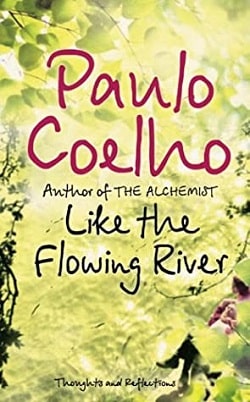Summary

Like the Flowing River
by Paulo Coelho
A breathtaking collection of reflections from one of the world's best loved storytellers, Paulo Coelho. In this riveting collection of thoughts and stories, Paulo Coelho, the author of 'The Alchemist', offers his personal reflections on a wide range of subjects from archery and music to elegance, traveling and the nature of good and evil. An old woman explains to her grandson how a mere pencil can show him the path to happiness...instructions on how to climb a mountain reveal the secret to making your dreams a reality!the story of Ghengis Khan and the Falcon that teaches about the folly of anger - and the art of friendship!a pianist who performs an example in fulfilling your destiny!the author learns three important lessons when he goes to the rescue of a man in the street - Paulo shows us how life has lessons for us in the greatest, smallest and most unusual of experiences. 'Like the Flowing River' includes jewel-like fables, packed with meaning and retold in Coelho's inimitable style. Sharing his thoughts on spirituality, life and ethics, Paulo touches you with his philosophy and invites you to go on an exciting journey of your own.
.
Read
Like the Flowing River on http://kissnovel.net
Martial Peak Reviews
Paulo Coelho’s Like the Flowing River is a profound collection of reflections that captures the essence of the human experience through a series of poignant stories and insights. Known for his bestselling novel The Alchemist, Coelho continues to enchant readers with his unique ability to weave philosophical musings into relatable narratives. This book is not merely a collection of essays; it is a journey through the intricacies of life, love, and the pursuit of happiness.
One of the most striking features of Like the Flowing River is its thematic diversity. Coelho explores a wide range of subjects, from the simplicity of a pencil to the complexities of good and evil. Each reflection serves as a reminder that wisdom can be found in the most unexpected places. For instance, the story of the old woman and her grandson illustrates how a simple object can symbolize the path to happiness. This narrative encapsulates Coelho's belief that life’s greatest lessons often come from the mundane, urging readers to look beyond the surface and find meaning in everyday experiences.
Coelho’s storytelling is characterized by its simplicity and depth. He employs a conversational tone that makes his reflections accessible to a broad audience. This approach allows readers to engage with the material on a personal level, often prompting introspection and self-discovery. The author’s ability to distill complex ideas into digestible narratives is reminiscent of the fables of Aesop, where each story carries a moral lesson. In this way, Coelho’s work resonates with readers who appreciate literature that not only entertains but also enlightens.
Character development in Like the Flowing River is subtle yet impactful. The characters, whether they are historical figures like Genghis Khan or everyday individuals, serve as vessels for Coelho’s philosophical insights. The story of Genghis Khan and the falcon, for example, delves into the themes of anger and friendship. Through this narrative, Coelho illustrates the folly of allowing anger to dictate our actions, emphasizing the importance of emotional intelligence and the value of relationships. This exploration of character dynamics adds a layer of richness to the book, inviting readers to reflect on their own interactions and emotional responses.
Another notable aspect of the book is its exploration of destiny and the pursuit of dreams. Coelho’s reflections on climbing mountains serve as a metaphor for overcoming obstacles in life. He encourages readers to embrace challenges as opportunities for growth, reinforcing the idea that the journey itself is as important as the destination. This theme is particularly resonant in a world where many individuals grapple with self-doubt and fear of failure. Coelho’s optimistic perspective serves as a beacon of hope, inspiring readers to pursue their passions with courage and determination.
The impact of Like the Flowing River extends beyond its pages. Coelho’s reflections encourage readers to embark on their own journeys of self-discovery and personal growth. The book serves as a reminder that life is a continuous flow of experiences, each offering valuable lessons that shape our understanding of the world. Coelho’s ability to connect with readers on an emotional level is a testament to his skill as a storyteller, making this collection a timeless resource for anyone seeking guidance and inspiration.
In comparison to other authors who delve into similar themes, Coelho’s style stands out for its lyrical quality and philosophical depth. Authors like Mitch Albom and Richard Bach also explore the intricacies of life and the human experience, but Coelho’s unique blend of spirituality and storytelling sets him apart. While Albom often focuses on the relationships between individuals and the lessons they impart, Coelho’s reflections encompass a broader spectrum of experiences, inviting readers to contemplate their place in the universe.
Ultimately, Like the Flowing River is a celebration of life’s complexities and the beauty of human connection. Coelho’s reflections resonate with readers from all walks of life, offering insights that are both timeless and timely. The book serves as a gentle reminder that we are all on a journey, and it is through our experiences—both joyful and challenging—that we discover our true selves.
In conclusion, Paulo Coelho’s Like the Flowing River is a masterful collection that invites readers to reflect on their own lives while exploring profound themes of happiness, destiny, and the nature of existence. With its accessible prose and rich philosophical insights, this book is a must-read for anyone seeking inspiration and guidance on their personal journey. Coelho’s ability to transform simple stories into powerful lessons makes this collection a treasure trove of wisdom that will resonate with readers long after they turn the final page.
























Reviews 0
Post a Reviews: